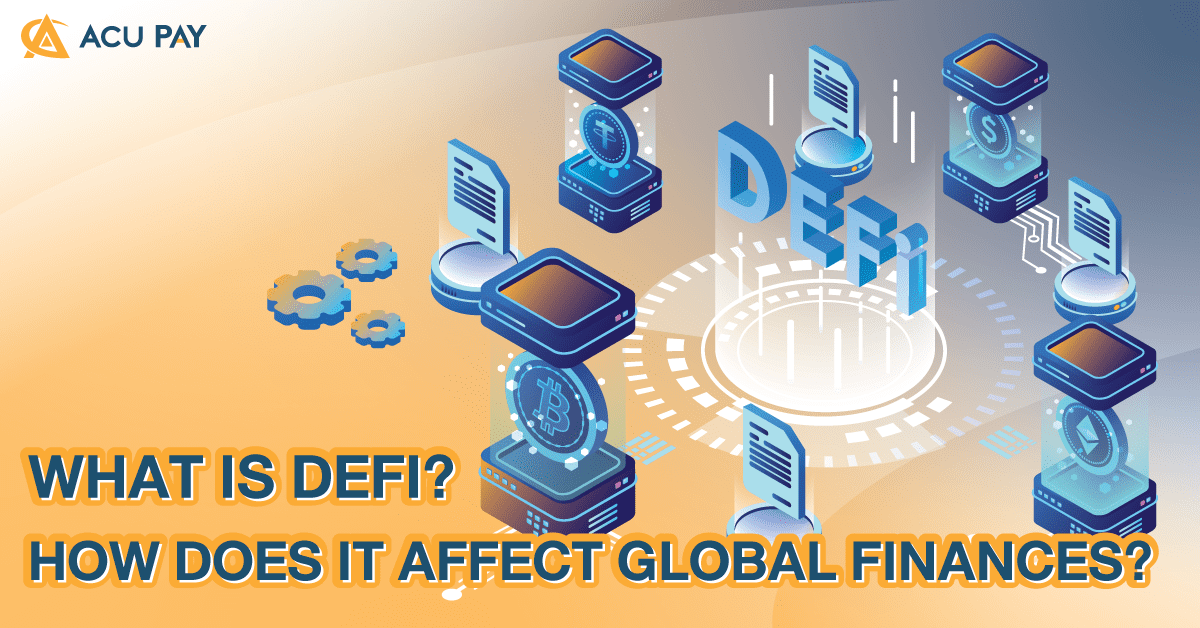
In the future, DeFi is expected to have a huge impact on the digital asset and financial industries of the world. because it is a highly secure technology and the central distribution can be checked. What will it affect and how will it change? Let’s see.

DeFi (Decentralized Finance) is a financial service that allows transactions to be performed without an intermediary. The most common DeFi we see is in the form of a DApp (Decentralized Application). Based on blockchain technology, transactions on DeFi are mainly related to digital assets. DeFi consists of three main components:
The DeFi protocol, or DeFi specification, is an agreement or computer language used to create, manage, process, and verify data. Including real-world asset conversion to be in digital form automatically. To continue to be a cornerstone in other DeFi services
The DeFi service operates on the DeFi protocol to create financial services and other functions related to the backend management system. such as setting risk parameters and interest rates, including financial services directly related to the user or the frontend. such as wallets where users can store assets as well as transfer and manage assets between them. There are also processes involved in the regulations and conditions of DeFi’s financial services.
A DeFi user is a person who has access to the DeFi service to make transactions. Since the current system of financial transactions is centralized finance: CeFi, the most obvious example is a bank that acts as a financial intermediary and monitors transactions. which has the advantage of helping users a lot. But the weak point is that if there is a problem with the intermediary, it will affect all users. While a decentralized system is a concept that allows all users to jointly administer the system or monitor each transaction together. With blockchain technology, it allows each user to store and access the information of all other users. A rough working principle is that when a transfer transaction occurs, the system will check the address information of every user as a logbook in each box (block). And when there is activity on the account, it will write the data on the new box after the original one as a chain, so it can prevent data theft and editing of the account information. both in terms of past and present account information.
DeFi will solve the bank’s pain point in the high administrative costs and fees for international money transfers. This includes the long approval period for cross-border remittances because the current operating system is still centralized. But with DeFi’s working model, multiple parties can join and approve transactions at the same time. Therefore, the execution of exchange activities can be done at a lower cost and faster. DeFi is also less vulnerable to cyber-attacks like a centralized financial system with a single centralized data source, making DeFi in this category the first to shake the financial industry. The impact of DeFi in this category on the banking sector may have potentially significant impacts in the near term. Because now there are already some DeFi users. Still, the majority of traditional financial services users may not trust DeFi as much, so it may take some time to prove themselves.
It will directly affect the banking sector. In particular, lending to SMEs and new forms of businesses, such as start-ups that do not have access to credit and financial services or receive services that do not meet their needs. This is because these businesses often do not have sufficient collateral or may have assets that are not yet commonly used by banks as collateral for loans. Additionally, banks’ credit risk assessment models may not yet support these new business models, resulting in borrowers being unable to access those loans. Or if a loan is approved, it faces high interest rates. In addition, the use of personal information in credit assessments may present a risk of information leaks and may lead to credit bias. DeFi could be a solution for both borrowers and lenders by offering high interest rates to those who deposit their money because there is no intermediary to share their profits. It also allows borrowers who do not have access to traditional financial services to access more funding. Therefore, for the financial and banking sectors, the impact of DeFi in this category could be significant.
However, borrowing through DeFi may still take some time to develop the service to be more suitable, which is estimated to take 3–7 years, as DeFi borrowing is often in the form of exchange for coins to invest and speculate on in the short term, in a manner more similar to a pledge, which has a high risk. The lender therefore requires overcollateralization, resulting in small business access to credit, and it is not very efficient. Some platforms require securities to be placed up to 150 percent above their current value. For example, MakerDAO requires a margin of 1.5 times. However, some platforms are still trying to develop to solve the problem of SMEs’ access to credit, especially ShutterOne from Singapore, which already provides lending services to more than 4,000 SMEs in the ASEAN.
It is another category that is used quite a lot. This is because traditional finance may not respond quickly enough to making payments with large volumes of transactions, and sometimes system crashes may occur. This is because the system needs to centralize all data for verification. And in some countries, some consumers may not be able to use traditional finance for payment transactions due to a lack of official identification. Therefore, bank accounts cannot be opened for daily use, including payment transactions. which DeFi on some platforms can solve both these pain points. because access does not require government identification documents. Decentralized operations can also help to resolve system crashes.
Therefore, for the financial and banking sectors, the impact of DeFi on this sector may be significant only in certain countries or groups, for example, in countries where some people have limited access to identity documents. But overall, the impact is likely to be low to moderate. In addition, many central banks are interested in and pushing forward the development of Central Bank Digital Currencies: CBDC, the importance of DeFi in this category may be can be reduced.
It is one of the financial services with high growth prospects and is therefore highly studied. because, at present, insurance companies still have to bear most of their own risk. from acquiring customers, assessing risks, and all the way to paying claims. Even though there is a reinsurer, there is still a part that insurance companies have to bear the risk themselves (retention). DeFi can help those companies by transferring some of their risks to investors who can take these risks in exchange for higher returns. However, the impact on the financial sector is unclear. because the platform is still under development. Therefore, there is still a problem with safety in actual use. There is also a lack of regulations to take care of this group of investors as well.